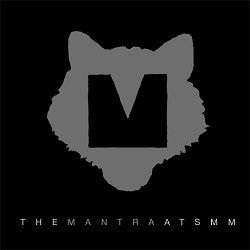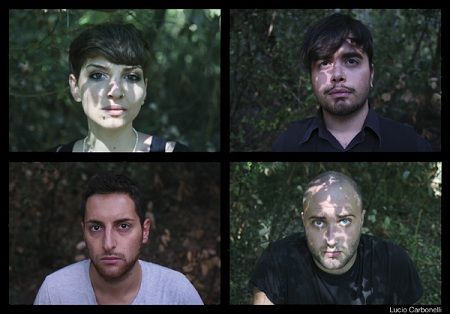
Interview by Matteo Bussotti

Maybe you don’t know them, but these boys (and their very talented female singer, Adriana), have toured all over Europe, and they’re surely proving abroad that Italy has something to say, also musically. With their strange, experimental rhythms they’ve made their way into many clubs and musical scenarios, and they’ve also composed some scores for some short or independent movie. We asked Adriana, their singer, to tell us more about this constantly growing band, with such a mysterious and interesting name.
Welcome, Adriana; first of all, tell our fans something about yourself!
Hello, well “I really have nothing to say, but I want to tell it all the same”.
We know that all of you, before becoming a band, were all friends. So…when did it come to your mind to say “Let’s put up a band!”? And how was it at the beginning?
During the high school I was playing with Salvio (the drummer) in a band and Davide and Maurizio (bass and guitar) were in another band. When these experiences came to an end and we understood that we had common ideas and intentions about music, so we decided to start with the Mantra. Everything happened in a very natural way for us. We had some line up changes, at the very beginning I just played guitar, then we became an instrumental band and after few months -during a recording session- we realized that I could have been the singer.
The Mantra started in 2008 their “professional” career, but you, Adriana, when did you start to sing? You started as a child?
I’ve been singing for about 3 years in a children choir and then in a polyphonic choir when I was a child, that’s where I had my first (and last) lessons of music theory and vocal technique. The repertory was classical music such as the Verdi’ s Requiem, Mozart’s Requiem and Beethoven symphonies. I stopped for a long period since I started my first band in high school, at 14. After that I’ve been “mute” for a long time, 5 years. I started to sing again with the Mantra, with a different consciousness and perception of my voice, now I want to study again.
What’s the story behind your strange and very long name?
Our name is a collage of different words and ideas that we consider important and inspiring. We are not used to reveal everything, we can tell you that “spotless” comes from the title of a famous movie (and the verses of a poem), “mantra” comes from the fascinating oriental culture.
You published with Aaaargh Records a 2-track vinyl. Why this choice, to make a vinyl instead of a CD? And, I must say…I love this choice, seriously. I really, really like vinyl. Good job!
First of all, we liked the idea to produce a beautiful object, something that you would like to have in an historical moment where buying a record is not the only way to listen to music. A vinyl has a strong appeal and feels more “material” to us. We also liked the fact that you have to put the record on the turntable, sit down and listen, it’s THE physical support. It helps to recover a quiet and almost sacred way to listen to music, something that with mp3 and streaming is going to be lost.
You composed various scores for different short films. How was it? In which way it differs from composing your own music for your own albums?
It’s a completely different work. When you compose music for a movie you have to be delicate, not too invasive and super accurate. You have to add beauty or suspense or happiness or anything else useful and blend it with images and words. It’s not just about yourself. It’s been funny and instructive, we learned how to afford technical issues about timing and dynamics and also experimented a new fascinating way to communicate something.

How was to start touring with God Is An Astronaut, after having published only one record?
Well, unfortunately we have been never touring with God is an Astronaut. We tried hard but for several reasons, we couldn’t. We had to play in UK and USA when they have been touring in Italy and we never found an easy way to arrange some shows together. Too bad. 🙂
What can you recall about your appearance on television, here in Italy?
We found that, unless you are overexposed (that is not always a good thing), TV doesn’t change your life. Live shows are the most important thing to do for an important growth, it’s real life. We have been in the RAI.tv homepage -the Italian State channel- for a week, we had a good feedback and several passages on media, it’s an important step but not the signal of a big success. It has been anyway an amazing goal and we don’t think it’s a bad thing, maybe it means that in some areas of music business, music is still important and not everything is depending from massive advertising and promotion.
You toured a lot, in Europe and in America. Can you tell us how fans from one “zone” to another are different from each other? I can’t remember who, but someone once said that, from nation to nation, fans “smell” differently. What can you say about that? Strange, isn’t it?
Of course we found that. UK, USA, Italy, Greece, every country (and city!) a different reaction. Most of the time very good, luckily; it also depends from the venue and the situation. I don’t want to be superficial, but I can say that generally in USA people are very interested in live music, they buy records and if they come to your show is because they want to listen to you. In UK people got stuck that we came from Italy, and had a very good reaction to our music defined “different” – even if they are an expert audience. Greece has been a surprisingly good experience, there are many interesting bands and everyone is very professional. Italy, well, the situation for music from the inside doesn’t look wonderful, but sometimes we cannot judge if we are directly involved. I can say that there’s less people going to the concerts, maybe because of crisis or lack of good venues but the few that are withstanding are the best, Italian people is fantastic and we love it from the bottom of our hearts. Anyway it’s matter of feelings and they change every time, not just because of the country. Meeting people is one the best part of being a musician.
How is working with such an important label as RareNoiseRecords?
Rare Noise Records is one of the best things that happened to us. They help us to build little by little our future and our dreams. We feel grateful and honoured to work with such professional and passionate people. Giacomo, the owner, is an amazing person and during these years he became more than a “boss” for us.
Your style (as a band, but also as as singer) is very close, in certain ways, to Radiohead’ s one. What influenced your style most?
I’ve been listening to tons of classical, jazz and 70s prog and rock music during my childhood without being conscious of it, now I found that influenced me a lot. As a teenager I started with hip-hop till I met the Nirvana, they opened my ears to the world of rock and alternative music. Now I can say that during the years I’ve become (as the rest of the band) a 360° music lover, I listen to all kinds of music and artists. I don’t have a definitive guide or model, I try to learn from the others and then forget, sing with my mind empty. In the last weeks I’ve been listening a lot to Hindi Zahra and Sufjan Stevens. Among female singers I love Billie Holiday, Beth Gibbons and Joni Mitchell and Lauryn Hill and.. they’re definitely too many. 🙂
How much is voice important for you, what’s its role in music, for you? Do you view it only as a way of delivering a message, or you think it’s an instrument itself? I’m referring to Jonsi’s (Sigur Ròs’ singer) point of view in this case. He considers voice a musical instrument itself, and he invented a new language, called “hopelandic” in order to deliver a message using not words, but sounds which melt perfectly with the music in Sigur Ros’ songs.
It depends from the genre and from the song, and -as a consequence- of your necessity. The voice is like an instrument but with an immediate communicative power, because of the possibility to use words and words are important to me. This is the reason why people listen in first place to the vocals, usually it’s the primary melodic “instrument” and it speaks, literally. I adore the album “( )” and I like the Jonsi’ s vocal approach as I consider it an instrumental album. In my personal opinion I think that every part must work perfectly with the others, everything in service of the song itself.
Moreover, do you think we should expand our vocal capabilities (like Jonsi, for example, or, if you know him, Demetrio Stratos), or is voice already well used, and we should leave it just like this? Is it right to explore voice, or maybe, sometimes too much experimentation leads only to confusion?
Of course, never stop improving yourself. Demetrio Stratos was a phenomenon, a unique case and an amazing talent. One on a million. For mortals like us, experimentation is positive as it leads to discover your limits and your possibilities. Singing is like a research on yourself, you can always find something new about your voice and you as a person. I also believe that it has much to do with your mind, it’s psychological. Personally I love melodies and I don’t consider myself an experimenter, but I believe that studying and working on sounds and different ways to use the voice increase possibilities to make your ideas, your intuitions become something real, concrete and beautiful at their best.
Thank you so much for your time, and…good luck!
Thanks to you for your interest and the beautiful interview. For everyone who’d like to contact the band email themantraatsmm@gmail.com we are always happy to be in touch with people.
Links
MySpace * Facebook * Google Plus * Twitter * Site